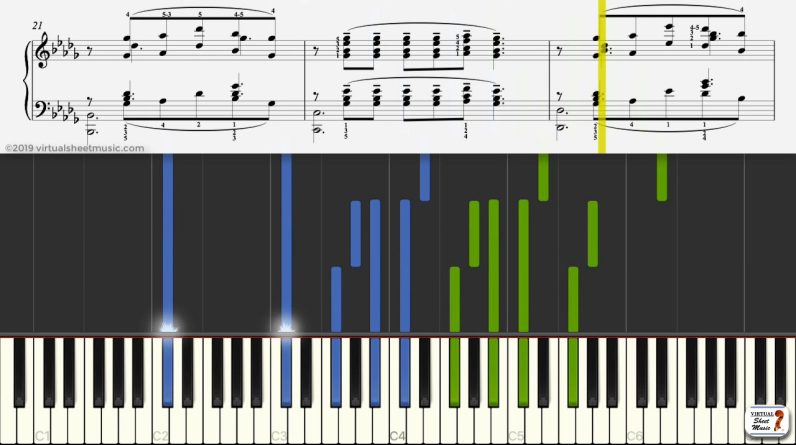#1 FAST Way to Learn Piano – Find Out How
Music & Neuroplasticity: Brain Benefits of Piano Playing
Music has always been a source of joy and inspiration for people all over the world, but did you know that playing music can also have a profound impact on our brains? It’s all thanks to a process called neuroplasticity, the brain’s ability to change and adapt in response to new experiences.
When we engage in activities like playing music, our brains form new connections and neural pathways, allowing us to improve and even excel at tasks we once thought were impossible. In this video Slava Presnyakov dives into the fascinating relationship between music and neuroplasticity, exploring 10 amazing brain benefits of piano playing based on the latest neuroscience and his personal experience.
Slava, a pianist with a Master’s Degree from the Conservatory of Amsterdam, is passionate about neuroscience and aims to inspire and provide a better understanding of music and the piano through his video series in collaboration with Pianos Maene.
Research has shown that extensive musical practice can lead to changes in the brain, particularly in the size of gray matter. When you play the piano, various areas of your brain, involved in muscle control, sensory perceptions, memory, emotions, speech, and decision-making, become activated and connected.
Additionally, studies have found that musical training can enhance white matter integrity, improve cognitive skills such as attention and problem-solving, stimulate the production of new neurons through neurogenesis, reduce stress and anxiety, and even have therapeutic benefits for individuals with neurological conditions like Parkinson’s and Alzheimer’s.
The positive effects of musical training on the brain can last long after the training has ended, highlighting the enduring nature of these benefits. So, if you’ve ever wanted to learn how to play the piano, it’s never too late to start and challenge your brain while discovering a whole new side of yourself in the process.
Brain Benefits of Piano Playing
Playing the piano not only brings joy and inspiration to your life but also has a profound impact on your brain. Thanks to a process called neuroplasticity, your brain has the ability to change and adapt in response to new experiences. When you engage in activities like playing music, your brain forms new connections and neural pathways, allowing you to improve and excel at tasks that you once thought were impossible. In this article, we will explore 10 amazing brain benefits of playing the piano based on the latest neuroscience research and personal experiences.
1.Increased Gray Matter
Research conducted by Gaza and Schlage has shown that musical training can increase the size of gray matter in your brain. When you play the piano, you engage various areas of your brain, and the more you practice and play, the more these brain areas become activated and connected. This includes regions of the brain involved in muscle control, sensory perceptions like hearing and seeing, memory, emotions, speech, and decision making. The increased gray matter in these brain areas leads to improvements in muscle control, sensory perceptions, memory, emotions, speech, and decision making.
2.Increased White Matter
In addition to increased gray matter, several studies have found overlapping results in both gray and white matter changes in the brains of musicians. White matter plays a crucial role in facilitating communication between different brain areas. The corpus callosum, which connects the left and right sides of the brain, is a part of the brain’s white matter. Research has shown that the anterior portion of the corpus callosum is significantly larger in musicians compared to non-musicians. This increase in white matter can enhance the communication between different brain areas and further improve cognitive abilities such as language, memory, and spatial skills.
Musical training has been found to enhance verbal memory, leading to improvements in language skills. Many musicians have a natural feel for languages and often speak multiple languages fluently. Playing the piano requires you to remember and recall musical patterns, notes, and sequences, which can carry over to improving your ability to remember information and lists. The enhancement in verbal memory can have a positive impact on your language skills, allowing you to better remember and communicate information.
3.Music as Therapy
Engaging in musical activities has been shown to improve cognitive skills such as attention, language, and problem-solving. Music can also stimulate the production of new neurons, a process known as neurogenesis, which further enhances cognitive function. This has led to the exploration of music as a therapeutic tool for individuals with neurological conditions such as Parkinson’s disease and Alzheimer’s disease. Studies have reported that musicians are less likely to develop mild cognitive impairment or dementia. Music therapy programs have been found to have positive effects on different aspects of human development in Parkinson’s patients, including communication, swallowing, breathing, and emotional well-being.
4.Improved Coordination
Playing an instrument, especially the piano, requires coordination between your hands and your brain. As you develop your piano-playing skills, you strengthen the connection between your brain and muscles, also known as the mind-muscle connection. This coordination can lead to improved motor skills and can have applications beyond music, such as driving, playing sports, and performing complex multitasking activities. The coordination skills developed through playing the piano can benefit various areas of your life.
5.Increase in IQ
Several studies have shown that musical training can increase IQ, particularly in areas such as spatial-temporal skills. Spatial-temporal skills involve understanding and manipulating visual and spatial information. Musical training has been associated with enhanced visual and verbal memory, executive function, and spatial-temporal skills in children. This positive impact on cognitive function extends to adults as well. Playing the piano can help improve your cognitive abilities and enhance your problem-solving skills.
6.Reduction of Stress
Listening to or playing music has been proven to reduce stress and anxiety. The therapeutic effects of music extend to individuals with depression or anxiety disorders. Engaging in musical activities has been found to improve cognitive function and emotional regulation in people with Parkinson’s disease. Playing the piano can serve as a form of meditation, allowing you to connect with your inner world and turn off any worries or thoughts. It provides a means to pour your emotions into the practice and release any tension built up in your body.
7.Improvement in Social Skills
Participating in musical activities often requires teamwork and collaboration, which can improve social skills and foster meaningful relationships with others. When you engage in musical activities, you work together with others towards a shared goal, creating a sense of camaraderie and cooperation. Playing the piano in a group setting can be a fun and enjoyable experience, allowing you to grow your brain and build social connections simultaneously.
8.Enhancement of Creativity
Playing music stimulates the brain and encourages creativity. It requires individuals to think critically and find solutions to problems, activating the part of the brain responsible for higher-level thinking and decision-making. The process of learning and creating music involves processing a lot of new information, which further stimulates the cortex, the part of the brain responsible for creativity. Playing the piano can unlock your creative potential and provide a platform for self-expression.
9.Long-Term Effects
The positive effects of musical training on the brain can last long after the training has ended, suggesting that the benefits of music are enduring. Studies have shown that musicians exhibit better motor performance and hand independence, demonstrating the long-term effects of musical practice. Musical training also improves focus and concentration, allowing individuals to develop a greater ability to stay engaged and attentive. These long-term effects of playing the piano contribute to overall cognitive development and well-being.
10.Increased Concentration
According to Rodriguez and his colleagues, the enhanced ability to divide attention visually is a result of both functional cognitive and structural changes occurring throughout the brain.
It can be confidently stated that practicing the piano, whether for short or long durations, will undoubtedly improve an individual’s capacity to concentrate.
Conclusion
In conclusion, playing the piano offers a myriad of brain benefits that can enhance various aspects of your life. From increasing gray and white matter to improving verbal memory, reducing stress, and enhancing coordination and social skills, the impact of playing the piano on your brain is profound. Engaging in musical activities not only brings joy and inspiration but also provides a means for personal growth and development. So, if you’ve ever wanted to learn how to play the piano, rest assured that it’s never too late to start. Challenge your brain and discover a whole new side of yourself through the transformative power of music.
Here you can find the articles, research, papers and journals mentioned in the video:
Neuroplasticity & Music:
https://www.researchgate.net/publication/325620629_Music_and_Brain_Plasticity_How_Sounds_Trigger_Neurogenerative_Adaptations
Musical training, neuroplasticity and cognition: https://www.ncbi.nlm.nih.gov/pmc/articles/PMC5619060/
Gaser C, Schlaug G. Brain structures differ between musicians and non-musicians:
https://pubmed.ncbi.nlm.nih.gov/14534258/
Playing a Musical Instrument as a Protective Factor against Dementia and Cognitive Impairment: A Population-Based Twin Study: https://www.ncbi.nlm.nih.gov/pmc/articles/PMC4269311/
Rodrigues A, Guerra L, Loureiro M. Visual attention in musicians and non-musicians: a comparative study: https://www.ncbi.nlm.nih.gov/pmc/articles/PMC4072088/
Bengtsson S, Nagy Z, Skare S, Forsman L, Forssberg H, Ullén F. Extensive piano practicing has regionally specific effects on white matter development: https://pubmed.ncbi.nlm.nih.gov/16116456/
Schlaug G, Jäncke L, Huang Y, Staiger J, Steinmetz H. Increased corpus callosum size in musicians. Neuropsychologia: https://pubmed.ncbi.nlm.nih.gov/8524453/
Gray matter density and white matter integrity in pianists’ brain. A combined
structural and diffusion tensor MRI study:
http://brainvitge.org/papers/Han%20Y_Gray%20matter%20density%20and%20white%20matter%20integrity%20in%20pianists%20brain_NeurosLettes2009.pdf
Memory Plos One:
https://journals.plos.org/plosone/article?id=10.1371/journal.pone.0186773
IQ:
https://www.ncbi.nlm.nih.gov/pmc/articles/PMC1281386/
Long Term Effects
Brain morphometry shows effects of long-term musical practice in middle-aged keyboard players:
https://www.frontiersin.org/articles/10.3389/fpsyg.2013.00636/full
How Musical Training Shapes the Adult Brain: Predispositions and Neuroplasticity:
https://www.frontiersin.org/articles/10.3389/fnins.2021.630829/full
- Pianoforall Review: By Current Pianoforall Student (2024) - January 16, 2024
- 7 Pitfalls Piano Beginners Face and Tips That Will Help - January 7, 2024
- Learn Clair de Lune Sheet Music by Debussy – Keyboard Practice Video - December 16, 2023








